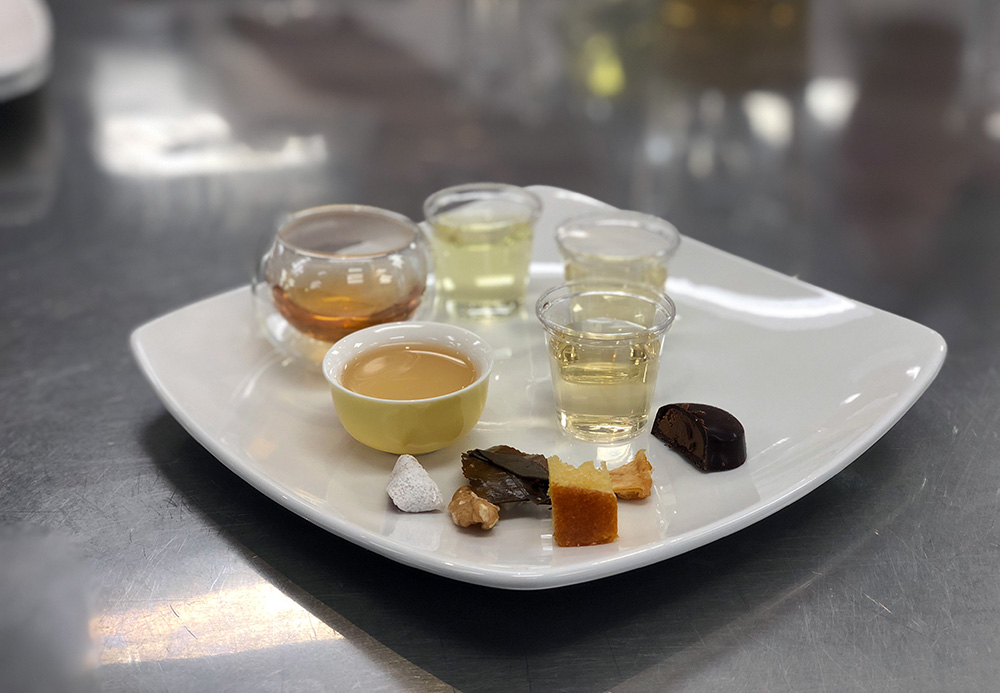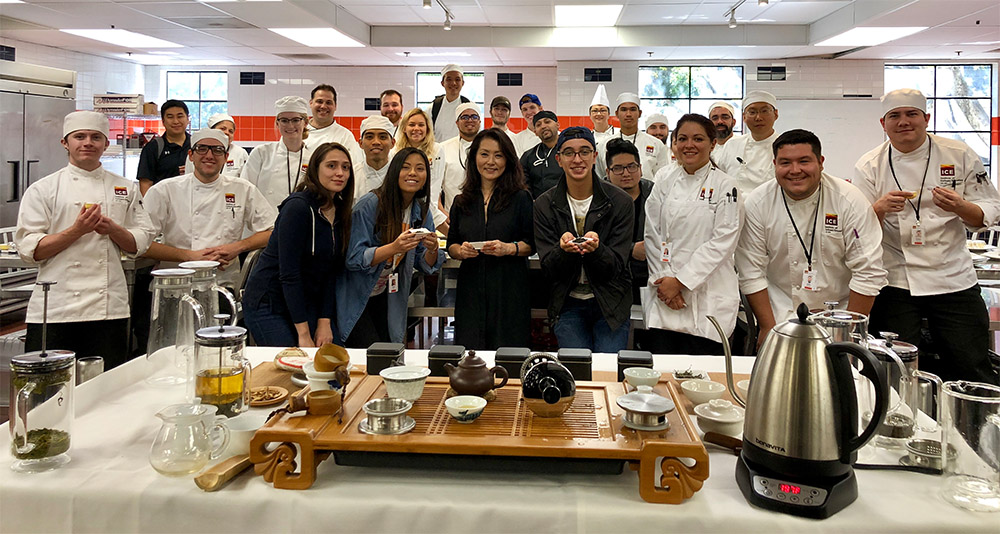
How a Culinary Arts Grad Became a Tea Expert and Educator
ICE alum Yoon Hee Kim (Culinary, ’05) teaches and leads tastings at a tea education center in Los Angeles.
In 2005, Yoon Hee Kim enrolled at ICE’s New York campus while a mother of three in her 40s. Her professional pursuits in the tea industry were developing and she chose the Culinary Arts program to complement those endeavors. Yoon Hee returned to ICE 13 years later as a guest lecturer at our Los Angeles campus. Here, she discusses her research in Korea, career ambitions and advice for culinary students.
How did you become engrossed in tea?
Tea has been a constant in my life even when I didn’t know it was. Once I began teaching tea, I learned that it was there before I was born. I came to the U.S. from South Korea when I was 9 years old, and I thought I was going to change the world — I was going to be president. (I was crushed when I learned that I was unable to do that.) As I was learning English, I saw a movie or read something somewhere and misunderstood what the word “speakeasy” meant. In the back of my mind, I planned to do politics or business first so that I had financial means, and once I found my successes and achieved my goals, I would open a speakeasy.
What kind of speakeasy?
Mine was going to be a tea community center where like-minded people came together through tea, music and literature, and it would be all about creating social change. That’s what I always had in mind: I would create a tea speakeasy. Through tea, you can discuss anything and everything and through that, you can create programs and activities to improve the human condition. That was my first conscious recognition that I wanted to do something with tea in my life.
What were your intentions when you enrolled at ICE?
My single most motivating factor was the opportunity to have a culinary background so I could speak with ease with the back-of-house folks about tea. I wanted to speak from the perspective of a chef and talk about why tea is important in the culinary world.
What was your impression when you started the Culinary Arts program?
I loved it. I ate up every minute of it. I had been working as a community organizer in politics as special advisor to Los Angeles Mayor Tom Bradley and ran non-profit organizations, such as directing the Asian Pacific American Students Organization at the University of Southern California. My life was nonstop — I moved to New York from California with three kids and was all about making things happen for others. So the idea that I could do what I loved, be in a classroom, have lectures and cook in the kitchen was an enormous joy.
Where did you do your externship?
I had two top choices and I was given the opportunity to do both — I had a dilemma. One was Blue Hill at Stone Barns and the other, which I ultimately chose, was Annisa. They were phenomenal but completely different restaurants. For Annisa, I had to leave my house at a crazy hour to drive to the city, pay to park, work in a small kitchen downstairs, and constantly carry things up and down the stairs. Ultimately, I chose Annisa because the idea of a mom from Westchester getting time to drive to the city and be immersed in a restaurant in the West Village was a dream come true.
What formal education did you receive in tea?
I studied with a tea master in Korea. She was one of the pioneers in the late ‘60s and ‘70s and one of the key educators that created the program that is used in the various tea schools throughout Korea. I learned from her for many years and received my full masters certification. I continue to study and work not just with tea masters but Buddhist nuns and monks in Korea. The best education for me is to be out in the tea fields, meeting producers and farmers in as many countries and regions as I can because there is constant innovation. I consider that as much of my formal education as the actual hundreds of hours of classes sitting with the grand tea master.
It sounds like tea is a constant learning process.
I am a lifelong tea student. There are so many different types of food, techniques and ingredients. Likewise, many people may think tea is green and black and that’s the end, but you could spend many lifetimes studying tea and you would barely scratch the surface.

What kind of work do you do as a tea expert?
I study and teach tea to laypersons as well as professionals. As of 2017, my partners and I opened a tea and culinary research center in Korea on a working tea farm with a factory that was built to conduct research. People come to learn about tea and get to pluck tea, learn how to make tea and leave with a packet of handmade tea. This tea factory and farm is one of the few places where the local government sends tea researchers. We want to take it to the next level and create a research institute. And I have a tea school [TeaClassics Tea & Food Arts Center] in LA, where I live, with five tea tasting rooms on the property. Three out of the five are open to the public for appointments, and the others are used for professionals.
What tips do you have for a restaurant looking to develop a tea program?
Tea is not and should not be considered an afterthought. It should at the very least be considered like fine wine or coffee, regardless of the category of restaurant. Now you have educated tea sommeliers, it would be very easy for restaurants to find them to have in-house education and training for staff and to really design tea menus that correspond with the vision of a particular restaurant. There are very few that do this around the country, and one that stands out is Eleven Madison Park.
Tea is not and should not be considered an afterthought. It should at the very least be considered like fine wine or coffee.
How do you think ICE helped you to realize your goals?
It solidified to me how important it is to have a good education program and the importance of not just good educators, but mentors. Everyone came to ICE with knowledge, but often it’s the intangible: how much an instructor’s heart is in educating. Educators who love teaching have that much more impact, and I was able to see that at ICE.

What advice do you have for current students?
Take advantage of your time at ICE. Whether 28 weeks or one year, the experience comes and goes in the blink of an eye. Truly make the most of the present moment. Being in the program may unearth things and allow you to discover things that you haven’t thought about, or you could go in with one idea but learn that’s not really what you love or learn you love creating recipes instead or that you want to study further with a food science degree or work in a test kitchen. For whatever amount of time you’re there for, commit to being in the moment and enjoying it as much as you can.
Build your culinary background with ICE's career programs in Los Angeles.


Bravo
Submitted by Jo on December 28, 2018 9:41pm
Yoon Hee always inspiring with true dedicated spirit❣️
Add new comment